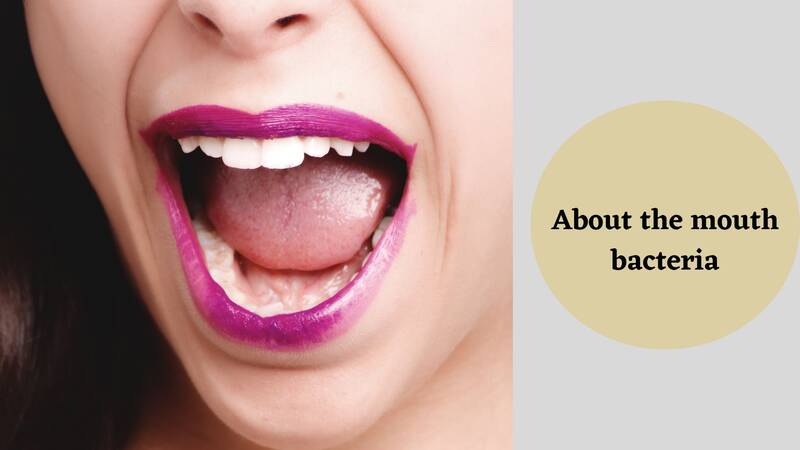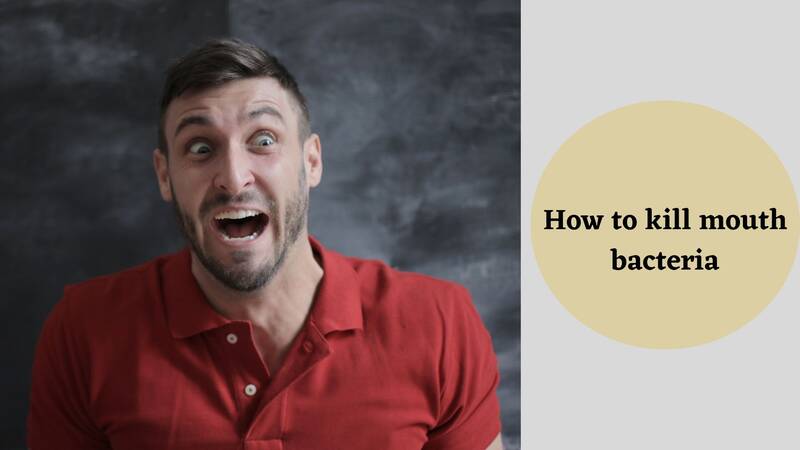There are about two diseases linked with gum diseases, such as rheumatoid arthritis and pneumonia.
But here today, we are going to aim mainly at mouth bacteria. So, how to kill mouth bacteria?
Bacteria are mainly present in our mouth and release toxins making their way into the brain based on new studies that are published.
They may even lead to or contribute to Alzheimer’s disease.
Today, here is what is going on and what you would be doing in terms of safeguarding your health while there are dentists around your globe throwing up their hands, stating to brush about twice daily.
Contents
How to kill mouth bacteria?

By doing the below mention things you can kill mouth bacteria and maintain your oral health
Brushing
Brushing your teeth daily is the most effective technique to destroy dangerous germs in your mouth.
Between brushings, nasty bacteria build up on your teeth, creating an unpleasant taste and a layer on your teeth.
Brushing your teeth early thing this morning and before bed will stop bacteria from growing and promote greater saliva to clear them away.
Remember to clean your tongue and change your toothbrushes every few months.
Flossing
Bacteria-causing plaque starts forming between your teeth and under your gums.
The buildup of plaque causes infections and cavities.
Flossing can help clean the spaces between your teeth and under the gumline removing plaque before it and causing any further issues.
Professionals recommend it since they effectively flush out bacteria and toxins from under the gumline.
Professional Cleanings
Mouth bacteria can be killed from all places through professional cleanings in places where regular flossing and brushing cannot reach.
There are regular checkups that can help detect issues before their start.
You can schedule an appointment with the professionals at least twice each year to prevent gum diseases and cavities.
Laser Therapy
The professionals even offer therapy involving a diode laser for treating gum health.
Laser therapies are effective, quick, and completely painless.
It is a non-invasive treatment that helps to ward off harmful bacteria from the mouth and heal the damaged gum tissues.
The laser penetrates deeper below the gum line to search for and destroy the infection-causing bacteria.
Avoid sugar intake
Another technique to fight nasty germs in your mouth is to replace sugar with xylitol.
Bacteria grow on sugar, which aids in their fast reproduction.
Bacteria love sugar, but they can’t metabolize xylitol.
Thus it kills them by starving them to death.
Bacteria can’t develop if they don’t have sugar to consume.
Just keep xylitol toothpaste and treats out of reach of pets—harmless, it’s for humans but poisonous to cats and dogs.
Consume fibrous food
The bacteria from your mouth can be removed physically with the help of brushing; however, chewing on fibrous food can also aid in removing the items from your teeth.
Fibrous foods like vegetables and raw fruits, apples, broccoli, carrots, etc., can act by shaking adhered bacteria from the oral cavity tissues and your teeth.
Rinse your mouth with water after meals
Instead of using mouthwash, it is always better to rinse your mouth with water after every snack or high-carb meal and brush 30 to 45 minutes later.
Water can help in buffering the collective bacteria till you are brushing.
About Mouth Bacteria

Our mouth has over 6 billion bacteria, including about 700 different species. A few would improve health, and the rest of them would provoke diseases.
A conservative idea of the number of ‘bad’ species is 15 to 20, but as we learn a little about how different species interact with one another, this number will continue to change.
As scientists refer to it, the Oral Microbiome is a sophisticated community with a lot of communication among bacteria of the same species across species.
You’re aware of their presence once your teeth feel sticky and need to be brushed.
Oral bacteria can also be found in your cheeks, tongue, chin, tonsils, and gums.
Unicellular microbes love to live in your mouth. It’s always wet, with a slightly alkaline and pleasant temperature.
Despite this ideal habitat, not all bacteria in your mouth remain dormant.
There are beneficial bacteria that keep our mouths healthy, but other germs cause decay, fractures, and gum disease.
Maintaining the proper fine balance can significantly impact your dental (and overall) health.
Let’s look at some startling facts regarding oral bacteria that you’ll never be aware of.
The oral Microbiome starts with the birth
Some bacteria reside within your mouth and start multiplying sooner with your birth.
Furthermore, oral bacteria pass from the mother to the kid, which highlights the vitality of better oral health during pregnancies.
Studies have noted that mothers having gum disease or ones who smoke while they are pregnant are likely to be passing along the harmful particles that increase the likelihood of kids suffering from gym diseases along with tooth decay in the latter part of their lives.
Oral microbiomes are the main cause of tooth decay
Between the ranges of one and five, around a quarter of all children in the United States suffer from early tooth decay.
According to studies, the major reason is an unbalance of different strains of bacteria, with acid-producing bacteria outnumbering beneficial bacteria.
Sugar reduction and avoidance of acid-producing meals can help to maintain a proper bacterial mix.
There are good bacteria
We usually associate the word “bacteria” with mold or rotting. Don’t be alarmed by your mouth’s germs—not all bacteria are dangerous, so make when it relates to your dental health! Good bacteria aid you in digesting food and protect you against decay caused by food particles by inhibiting the growth of harmful bacteria.
Sugar particles will be converted to acid by harmful bacteria, balancing your mouth’s pH and promoting plaque development.
A better balance of both kinds of bacteria maintains your mouth healthy and steady.
Better oral health means good overall health
Your dental health and your entire health are more intertwined than you may know.
As you exhale, drink, and eat during the day, your mouth provides a channel to the parts of the body.
If hazardous germs or pathogens in your mouth are not controlled, they can spread throughout your body.
Your health could impact your oral health
This link is reciprocal: although your bacterial Microbiome might influence your general health, your dental health can also be used to identify certain diseases.
Tooth dislocation and tooth loss are common early indications of osteoporosis.
As a result of their inability to prevent blood sugar, diabetes patients frequently have poor periodontal health, which promotes the growth of harmful bacteria and points to poor insulin regulation.
Understanding the connection between germs and your body would be the first step toward a healthy dental hygiene practice.
In certain situations, it may even assist you in avoiding or diagnosing major health issues down the line, therefore promoting overall health.
If you wish to understand how your good versus harmful bacteria interact in your mouth, talk to your dentist.
Issues that are caused by harmful bacteria
Harmful bacteria such as Streptococcus mutants mainly cause several oral health issues that include the following:
Tooth decay. The commonest issue with dental health is tooth decay, which is caused by a buildup of bacteria in the mouth.
Cavities. Decay of tooth leads to the formation of cavities without any treatment. They are extremely painful and worsen when left untreated.
Gingivitis. Mouth bacteria are not just related to the issues in the teeth. Overall, health issues can also happen with gingivitis.
Halitosis. While bad breath might not be threatening, it is hard and potentially causes issues for the ones affected, indicating some serious underlying problems.
Read– Does Tooth Extraction Hurt?
FAQs
Below we share some FAQs related to the question “How to kill mouth bacteria”
1. Is it true that salt kills germs in the mouth?
Is it true that saltwater kills bacteria? The mouth, along with the throat bacteria, can be killed by saltwater, but not all of them.
Salt solutions, on the other hand, can assist germs in entering the atmosphere of the gums, teeth, and throat.
2. Is hydrogen peroxide effective in killing germs in the mouth?
Gargling with hydrogen peroxide, which destroys germs, can help relieve your pain from a sore throat by battling bacteria in the mouth and throat.
Reducing the number of germs in the throat and mouth also speeds up the healing process.
3. Is baking soda effective in killing germs in the mouth?
If used without bleaching agents, baking soda has been demonstrated to aid in killing bacteria that cause gum disease and has led to improved gum health.
Baking soda removes superficial stains and assists in breaking biofilm that bothers the gums.
4. Is Listerine effective in killing germs in the mouth?
According to studies, antimicrobial LISTERINE® mouthwash destroys oral germs in 30 seconds, resulting in a noticeable change with ongoing usage.
Within 30 minutes of coming into touch with LISTERINE® rinse, germs in plaque & saliva samples were eliminated. Don’t give bacteria a chance to fight back.
5. How often should I use peroxide to rinse my mouth?
Make use of them up to four times each day, or as a dentist or doctor suggests.
To attain the benefit of this product, use it daily. Use it at the same analytics and insights) every day to help you remember.
6. Can you retain hydrogen peroxide inside your mouth for a long time?
Make sure to combine equivalent portions of water with hydrogen peroxide. Rinse your mouth with this combination for about a minute.
If you feel irritation in your mouth with this formula, then spit it out to avoid ingesting it.
7. Is saltwater effective in killing bacteria?
Saltwater rinsing can help kill various kinds of bacteria through osmosis, which can help remove water from bacteria.
They also help work as safeguards against infections, mainly after any of the treatments.
8. Is alcohol-free mouthwash effective in killing bacteria?
On the other hand, alcohol-free mouthwash tackles bad bacteria instead of good bacteria, resulting in an optimal bacterial balance to avoid future issues and battle unpleasant breathing problems.
9. What methods do you use to cleanse your tongue?
Tongue scraping removes germs, food particles, and apoptotic cells from the tongue’s surface.
By bending a supple neem twig into a U shape, you may use it as a throwaway tongue scraper.
Scratching your tongue daily helps to increase metabolism by removing germs and toxins from your mouth.
Read– Can Tooth Decay Be Reversed?
Key Takeaway
- Before knowing how to kill mouth bacteria, it is important to understand that there are about 500 and 1000 different types of bacteria present in our mouth.
- A few foods can help in flushing bacteria from the teeth. The crunchy or fibrous veggies like carrots and celery can help stimulate the gums, while there are acidic fruits like apples that increase saliva production for washing the teeth clean.
- The tongue is effective enough in holding a distinctive part of the bacteria in the mouth. The essential part is to keep your tongue clean with regular flossing and brushing since bacteria on the tongue contribute to bad breath and gum diseases. Make use of metal or plastic tongue scrapers for clearing out bacteria!
Read– Red Spots On Roof of Mouth
- Understanding HIPAA Compliance: Obligations for Covered Entities & Business Associates - April 18, 2024
- Things to Invest in for the Easter Season in 2024 - March 29, 2024
- Why Experience Matters: Finding An Established Dental Implants Provider - March 29, 2024
